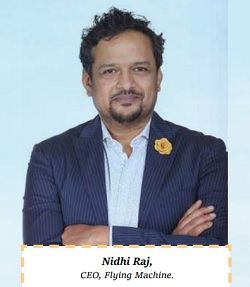As a response to the growing demand for global fashion and high-quality denim products, homegrown brand Flying Machine was launched in 1980 by Arvind Lifestyle Brands Limited, a subsidiary of Arvind Limited, one of the largest textile conglomerates in India.
With access to cutting-edge technology and best in class collaborations with industry experts across the globe, Flying Machine has since evolved into a popular and well-established jeanswear brand in the country as well as an innovative fashion brand, with a special focus on Gen Z audiences.
Flying Machine’s growth story began in 1994, when it became the first Indian denim brand to introduce stone-washed denim, a popular trend at the time. From then till today, the brand prides itself of being the ‘creative maverick’ in denim technology in the Indian market.
One of the brand’s most popular and successful product lines is F-Lite Jeans – shockingly lightweight, flexible and luxuriously smooth. The brand also offers an ample choice of fits across its denim portfolio
• The ‘Jackson Fit’, which is skinny
• The ‘Cobain Fit’, its most-loved loose fit
• A wide range of finishes from Lux Raw washes to athentically aged, worn out vintage jeans in various styles such as Carpenter Pants, Classic 5 Pockets, Truckers and D-Mach, make up its range of ergonomics And the upward journey didn’t stop here.
 “Between 2011 and 2021, Flying Machine introduced its new logo and built a strong retail presence. We partnered with various celebrities and influencers to promote ourselves, creating a strong association between products and young consumers In 2018, we ventured into the e-commerce space, launching our official online store and reaching a much wider audience of online shoppers,” says Nidhi Raj, CEO, Flying Machine.
“Between 2011 and 2021, Flying Machine introduced its new logo and built a strong retail presence. We partnered with various celebrities and influencers to promote ourselves, creating a strong association between products and young consumers In 2018, we ventured into the e-commerce space, launching our official online store and reaching a much wider audience of online shoppers,” says Nidhi Raj, CEO, Flying Machine.
“Our next phase of progress, which started 2021 onwards, saw us sharpening our focus on Gen Z with #Damnhot Fashion. We then introduced a contemporary new logo and an upbeat retail identity,” he says, adding, “We are now expanding into major cities with large
size modern stores. The key focus for this phase remains 1) timely and quick response to evolving trends, 2) meaningful and deep consumer connect, 3) easy accessibility for Gen Z consumers and 4) an uplifting and thrilling consumer experience.”
And the refreshed retail identity is nothing short of sexy and mood lifting. While the consumers enjoy the 40+ year legacy of Flying Machine, the brand itself has always taken bold steps to completely re-invent its products with an obsession to stay ahead of the curve on engineering products as per evolving consumer demands.
Cutting-Edge Technology
Flying Machine’s obsession with quality and variety makes its product fashionable and yet built to last. The brand continuously scouts for and plans to integrate, the latest denim trends and innovations. Being part of one of the world’s most successful denim mills, Arvind Ltd., Flying Machine enjoys enviable advantage on latest cutting-edge technology and innovation.
“The top three technologies pivotal for denim brands like ours include laser technology for designs and finishes, eco-friendly dyeing techniques, and advanced fabric technologies for enhanced comfort and durability,” explains Nidhi Raj.
Retail Reach
Flying Machine has a strong retail presence in India and is available in various stores across the country. The brand has ‘Flying Machine Stores’ in major cities. Its products are also available in major multi-brand retail outlets, department stores, and online platforms.
“While our primary focus has been the domestic market, the brand’s outreach through
online platforms gives it a global footprint. We thrive particularly in urban and semi-urban regions, catering to the fashion-conscious demographic there,” explains Nidhi Raj.
The brand is particularly popular in Delhi-NCR, Uttar Pradesh, Andhra Pradesh, Telangana and Bengaluru regions. Emerging regions for the brand are Pune, North East, Rajasthan and Gujarat. However, Nidhi Raj says that tier 2 cities and beyond are crucial for the brand’s expansion. “The brand has a lot of headroom in Tier 1; but due to rising disposable incomes, increasing fashion awareness and digital penetration, Tier 2 and beyond are an extremely important source of growth for us as well,” he says.
The brand is also committed to building a strong Omnichannel strategy to ensure a seamless shopping experience.
“Whether the customer is shopping online from a mobile device, a laptop, or in a brick-and-mortar store, the experience should be fluid and consistent. This approach integrates our online and offline presence, enhancing customer engagement and brand experience,” says Nidhi Raj.
“In the next 2 years, we aim to significantly increase our store count, focusing primarily on
expanding our presence in Tier 1 and Tier 2 cities. Our store location strategy revolves around high-street locations and popular malls ensuring maximum footfall.
The average size of these store would be in line with our current standard store format, designed for optimal customer experience,” he adds.
Marketing Strategy Flying Machine – which is Gen Z focused – has a marketing strategy that encompasses a mix of digital marketing for wider reach, influencer collaborations for relatability, and exciting in-store experiences for engagement.
“Celebrity collaborations and endorsements have always worked to add immense value and visibility to our brand,” says Nidhi Raj, adding that Flying Machine’s association with leading e-commerce platforms like Flipkart and Myntra has also contributed towards the broadening of its consumer base.
|
BRAND SPECS Target Audience
Psychographic Profile
Product Range
|
Sustainability & Ethical Practices
Sustainability is central to Flying Machine’s ethos. The brand emphasizes on eco-friendly manufacturing, incorporating sustainable practices, and utilizing organic materials.
“Meeting sustainability expectations of modern consumers are particularly challenging fo us, and we take this challenge seriously. Our approach includes reducing environmental impact through water-saving processes in production and ethical sourcing of materials,” explains Nidhi Raj.
Other challenges Flying Machine faces include intense competition from both domestic and international players and rapidly changing fashion trends. Navigating supply chain disruptions and maintaining customer engagement in the digital age are additional hurdles
as is the fact that the retail space getting very expensive. And the brand works around the clock, with one of the youngest, most dedicated teams in denim retail, to mitigate these challenges.
“We believe in the power of youthful energy and pride ourselves on having one of the youngest teams in the industry,” says Nidhi Raj.
And while the brand’s financials remain confidential, Nidhi Raj says he’s highly optimistic about the brand’s growth trajectory considering the expansion plans, consistent innovation, and the growing affinity for denim in the Indian fashion landscape.
|
GROWTH PHASES FOR FLYING MACHINE PHASE 1 – 1980 to 2010 Launched in 1980, Flying Machine, the India’s first homegrown denim brand expands its distribution network across major cities in India, establishing itself as a prominent player in the Indian denim market by the mid 90’s and opens its first exclusive branded retail store in 2000. PHASE 2 – 2011 to 2020 Flying Machine introduces its new Logo and builds strong retail presence. The brand partners with various celebrities and influencers to promote its brand, creating a strong association between its products and young consumers. In 2018, the brand ventures into the e-commerce market, launching its official online store and reaching a wider audience of online shoppers. PHASE 3 – 2021 onwards Flying Machine sharpens its focus on Generation Z with #Damnhot Fashion. The brand introduces its contemporary new logo and an upbeat Retail Identity. The brand is expanding into major cities with large size modern stores. The key focus for this phase remains 1) timely and quick response to evolving trends, 2) meaningful and deep consumer connect, 3) easy accessibility for the new GenZ consumers and 4) uplifting and thrilling experience |




